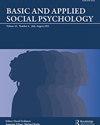Sustainable Consumption: What Works Best, Carbon Taxes, Subsidies and/or Nudges?
IF 1.8
3区 心理学
Q2 PSYCHOLOGY, SOCIAL
引用次数: 9
Abstract
Abstract Behavioral change techniques may show positive changes to sustainable consumption, but as with many other domains, how they interact with other typical regulatory measures is unknown. To address the empirical lacuna, the present study uses a discrete-choice set-up to simulate a lunchtime canteen in order to investigate the effects of choice preserving and choice incentivizing interventions on meal choices. Carbon tax (Experiment 1, Experiment 2) alone, behavioral interventions (Experiment 1) alone, as well in combination (Experiment 1, Experiment 2) shifted choices to a less degree than in combination. The most compelling positive behavioral change was found when introducing a redistributive pricing system that combines carbon tax and subsidies (Experiment 2), in combination with choice preserving instruments (Experiment 2, Experiment 3).可持续消费:什么最有效,碳税,补贴和/或核能?
抽象行为改变技术可能显示出可持续消费的积极变化,但与许多其他领域一样,它们如何与其他典型的监管措施相互作用尚不清楚。为了解决经验空白,本研究使用离散选择设置来模拟午餐食堂,以调查保留选择和激励选择干预对用餐选择的影响。单独的碳税(实验1、实验2)、单独的行为干预(实验1)以及组合(实验1和实验2)比组合在较小程度上改变了选择。最引人注目的积极行为变化是在引入将碳税和补贴相结合的再分配定价体系(实验2),以及保留选择的工具(实验2,实验3)时发现的。
本文章由计算机程序翻译,如有差异,请以英文原文为准。
求助全文
约1分钟内获得全文
求助全文
来源期刊

Basic and Applied Social Psychology
PSYCHOLOGY, SOCIAL-
CiteScore
4.50
自引率
12.50%
发文量
7
期刊介绍:
Basic and Applied Social Psychology (BASP) emphasizes the publication of outstanding research articles, but also considers literature reviews, criticism, and methodological or theoretical statements spanning the entire range of social psychological issues. The journal will publish basic work in areas of social psychology that can be applied to societal problems, as well as direct application of social psychology to such problems. The journal provides a venue for a broad range of specialty areas, including research on legal and political issues, environmental influences on behavior, organizations, aging, medical and health-related outcomes, sexuality, education and learning, the effects of mass media, gender issues, and population problems.
 求助内容:
求助内容: 应助结果提醒方式:
应助结果提醒方式:


